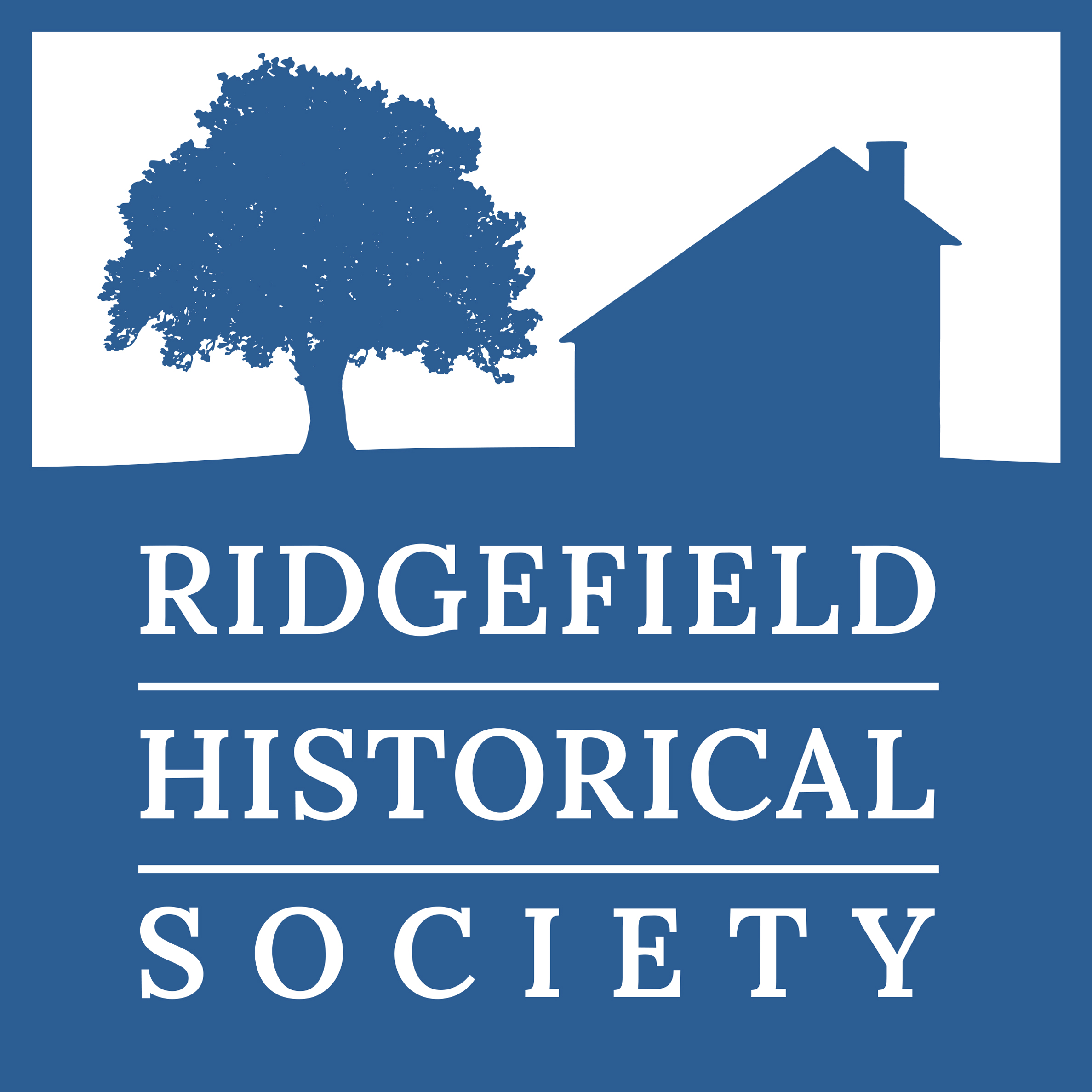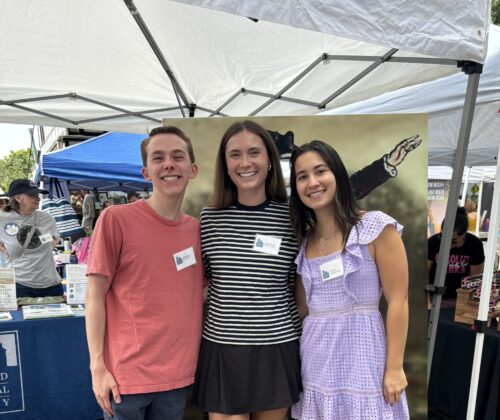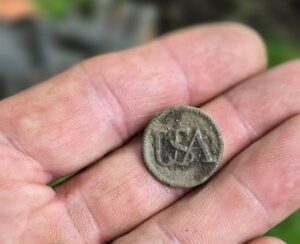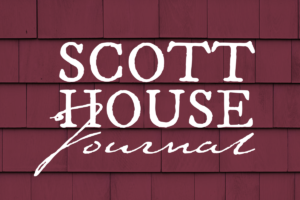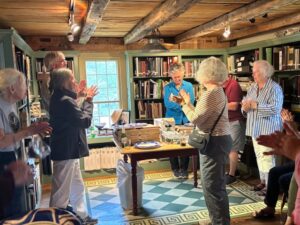
Libby Maxwell, 2024 Goldstone Family Intern
Can you tell us about your background?
My name is Libby Maxwell and I am from Wilton, Connecticut. I have just graduated this spring from Hobart and William Smith Colleges, where I was a student – athlete pursuing a major in Architecture and a minor in Art History. In my free time, you can find me playing music in my headphones while I draw, or staying active either in the gym or on the field. My post-grad plans begin this September, as I am heading to Edinburgh, Scotland to acquire my Master’s in Conservation Architecture.
What sparked your interest in history and led you to select the Ridgefield Historical Society as your internship?
I grew up overseas, and my family was always exposing me to the histories of Europe and the beauty that comes with it. I believe that my love for the old began there, seeing what memories are held and made within the relics of the past. Because of this adoration, I am choosing a path in my field of study that works intimately with the old, and how to keep it relevant in our growing world today. Choosing the Ridgefield Historical Society’s internship allowed me to experience historical conservation that involved much more than just a view centered around architecture. Getting to see the inner workings of a town-led organization is a very special experience that I wanted to be a part of.
What specific projects or experiences have you been involved in during your internship with the Ridgefield Historical Society? How have your projects shaped your understanding of the town’s history?
During my time here, we have delved into many projects which have included the sleeving of Clarence Korker negatives, organizing files in our vault, and playing detective with a box of mystery spoons. All of these activities have given me different narratives, a few of them surprising, about Ridgefield’s history and the many occurrences that have happened over the years in the small Connecticut town.
What was the most interesting thing you learned during this internship?
The most interesting thing I have learned during this internship is how much community is brought together through history, whether shared or individual. Being able to sit in on our monthly history club meetings, allowed me to listen to people sharing their memories of their childhood and adolescence while finding commonalities amongst each other. The community seems so much stronger in that one little room, because of the joy it brings everyone to be able to become nostalgic about a common summer camp, town festivity, or location.
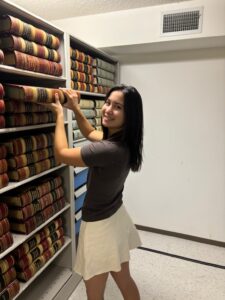
Lexie Hirai, 2024 Goldstone Family Intern
Can you tell us about your background?
My name is Lexie Hirai and I was born and raised in New Canaan, Conn. I am currently a rising sophomore attending the University of Denver and am majoring in History with an undecided minor. I enjoy spending my time mostly outdoors whether that consists of skiing, running or walking my stubborn dog around the block. When I am indoors I usually have my head in a book. As I continue to develop my passion for History, I also have a love for education, and will hopefully continue my studies at a graduate school.
What sparked your interest in history and led you to select the Ridgefield Historical Society as your internship?
I grew up attached to my mom’s hip, she worked as a history teacher at Staples High School. From museums and tours to presidential libraries and war sites, family vacations would be centered around visiting some historical site (I recently traveled to The Netherlands and visited 5 museums in a five day period!). I would reluctantly visit many historical sites that slowly began to grow on me. When I was around eight years old I wrote an essay documenting the FDR museum which cued my mom into my growing love for history. As an Intern at the Ridgefield Historical Society I am able to uncover and organize many different artifacts that carry different stories and lives that I have always loved to explore. I believe the importance of any history is far too overlooked and undervalued, so by becoming an intern it invites myself and other volunteers to explore the treasure trove of the archives below the Scott House.
What specific projects or experiences have you been involved in during your internship with the Ridgefield Historical Society? How have your projects shaped your understanding of the town’s history?
The most interesting project I was a part of was organizing some of the flat storage units in the archives that held many vital pieces of historical newspapers, such as the death of Roosevelt, the New York Times headline of World War 2, and odd advertisement sections that sold petroleum extract to grow hair! The most captivating historical event to me is World War 2, and reading about the immediate responses of the news outlets before The United States entered the war was very interesting. It was also interesting to learn about the men of Ridgefield who nobly served and lost their lives during World War 2, and how they were drafted right after they finished high school graduation, which puts into perspective how impactful the war was on even the small Connecticut towns such as Ridgefield.
What was the most interesting thing you learned during this internship?
The most interesting thing I learned while interning at the Historical Society was the preciousness of cataloging artifacts and documents into the archives. Organizing and labeling is paramount in making an artifact accessible to the volunteers, workers and visitors of the society who would like to examine the collections. By filing and cataloging, it makes finding historic pieces much easier. A majority of the work is organized, due the expansive collection of historic items that have been gifted or loaned to the historical society.
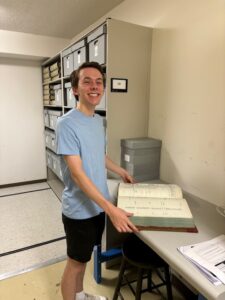 Tyler Ingram, 2024 Georgianne Kasuli Intern
Tyler Ingram, 2024 Georgianne Kasuli Intern
Can you tell us about your background?
This upcoming year, I’m going to be a junior at George Washington University in Washington, DC. I graduated from Ridgefield High School in 2022 and have lived in Ridgefield my whole life. I’m currently majoring in Biological Anthropology with minors in Archaeology and Human Anatomy. I’ve had a lot of amazing opportunities through these programs, one of which being the archaeological dig I attended last summer in Ireland which was really fun and eye-opening. At school, I also play the flute in the GW Orchestra and I am the president of Delta Iota Gamma, the world’s first pre-professional anthropological fraternity. In my free time, I love to listen to music, go to the movies, play with my dog, and of course learn about history!
What sparked your interest in history and led you to select the Ridgefield Historical Society as your internship?
I wanted to intern at RHS this summer because I had previously interned here in 2022 and really enjoyed my experience. Working hands-on with such old artifacts and getting to talk to other Ridgefielders who have such a rich knowledge of the town really made me appreciate Ridgefield’s history even more. I think my love of history started when I was a kid, as my dad collects PEZ dispensers and I always loved to help him organize his collection. Learning about the history of each dispenser and organizing them in neat displays made me feel like I was a museum curator, and I think that experience really made me want to pursue a career in museums and history.
What specific projects or experiences have you been involved in during your internship with the Ridgefield Historical Society? How have your projects shaped your understanding of the town’s history?
This year, I’ve been involved in a ton of projects, from organizing the vault, to sitting in on collections meetings, to sleeving negatives from a town photographer. One thing I’ve really appreciated about my work this summer is that every day brings something new, and we’re always working on something new and exciting. Across all of these projects, I feel like I’ve gotten a better sense of how Ridgefield evolved over time. Looking through old photos, it’s interesting to see what remains of older structures on Main Street or in Branchville, and how newer buildings have formed around them. It was also interesting to learn that Ridgefield used to mostly be made up of estates that lots of working-class immigrants worked on, because the demographics have changed so much over the years. Finally, learning about the roles that the enslaved people had in the Scott House has been enlightening, as we often hear the narrative that slavery didn’t exist in the north. I think it’s important to shine a light on the more upsetting moments in history, and I’m glad the Historical Society is engaging with that in a meaningful way.
What was the most interesting thing you learned during this internship?
One project we worked on that taught me something interesting was a collection of records and memorabilia from the singer James Melton from the 1950s/1960s. Today, we see a lot of fanaticism around celebrities and fan groups forming online, so I thought it was really cool to see the way that these fans interacted before the internet. They communicated through letters and voice tapes, and had to save hundreds of tape recordings of Melton’s performances in order to listen to his music. It took a lot more effort to connect with other fans and engage with your favorite artist back then, and that project made me appreciate how connected we are today, and how much easier it is to access media on our phones.
